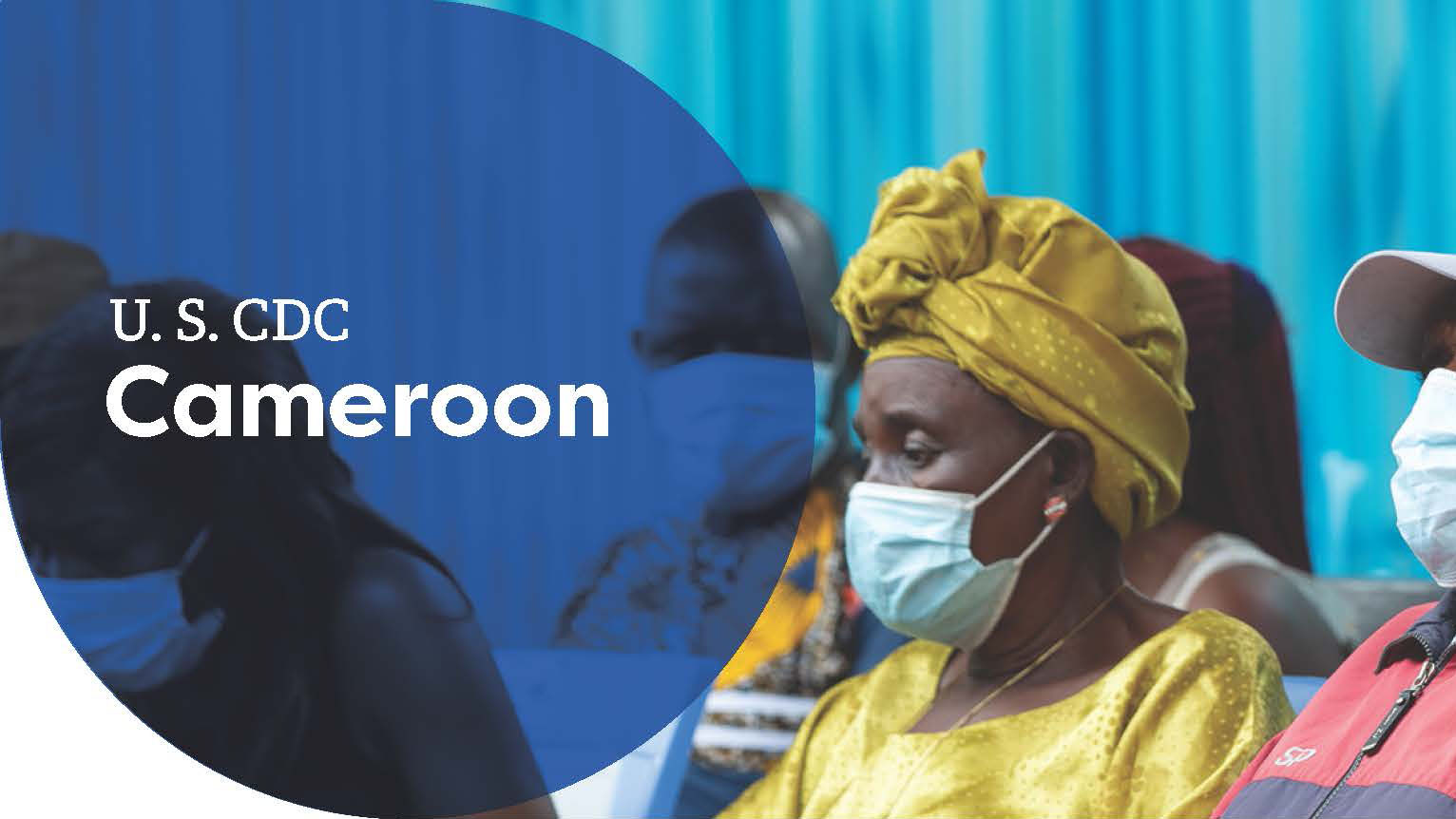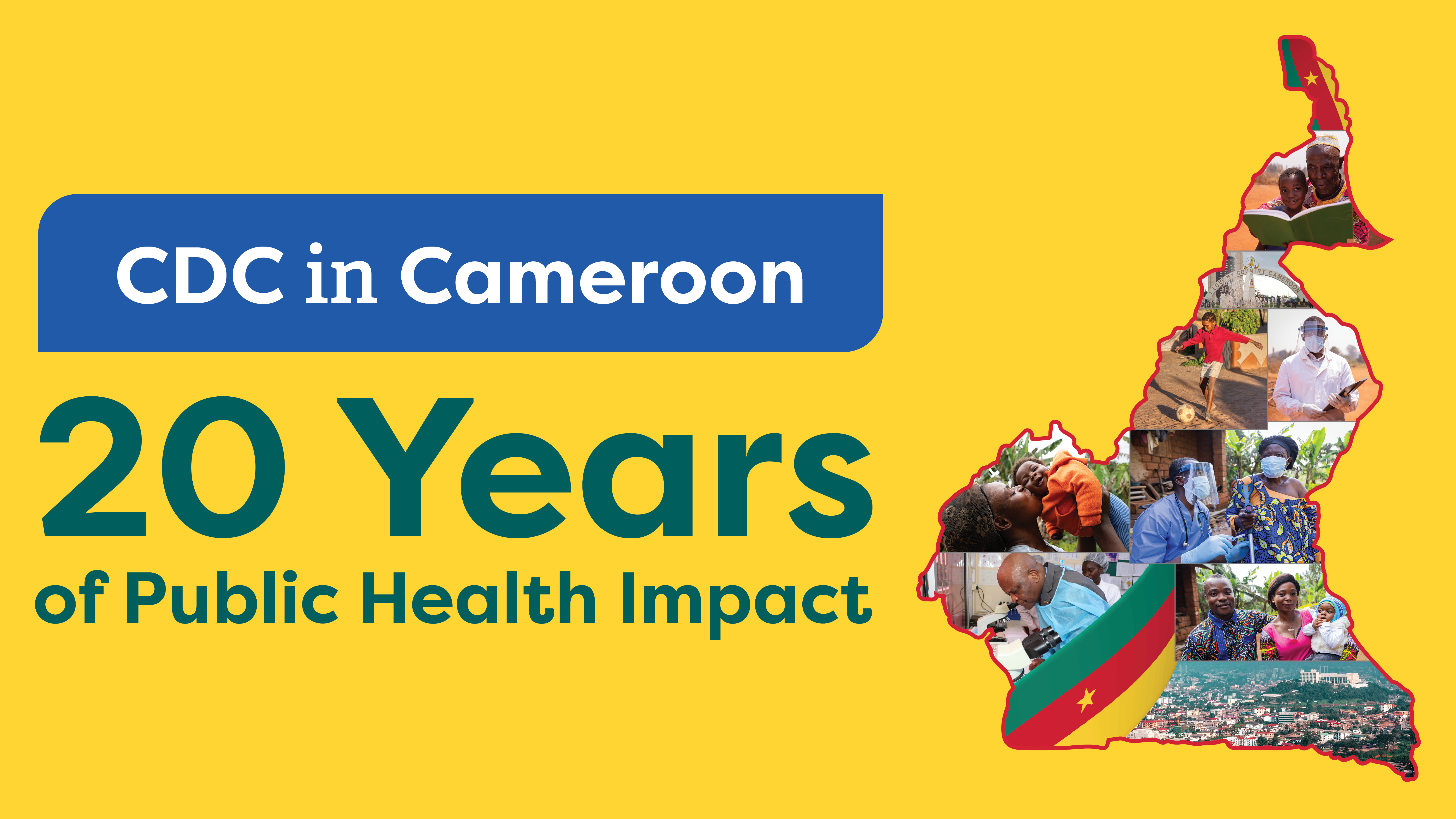At a glance
CDC works with Cameroon's Ministry of Public Health (MOH) and other partners to build effective public health collaboration and partnerships, which strengthen the country's core public health capabilities: data and surveillance, laboratory capacity, workforce and institutions, prevention and response, innovation and research, and policy, communications, and diplomacy.
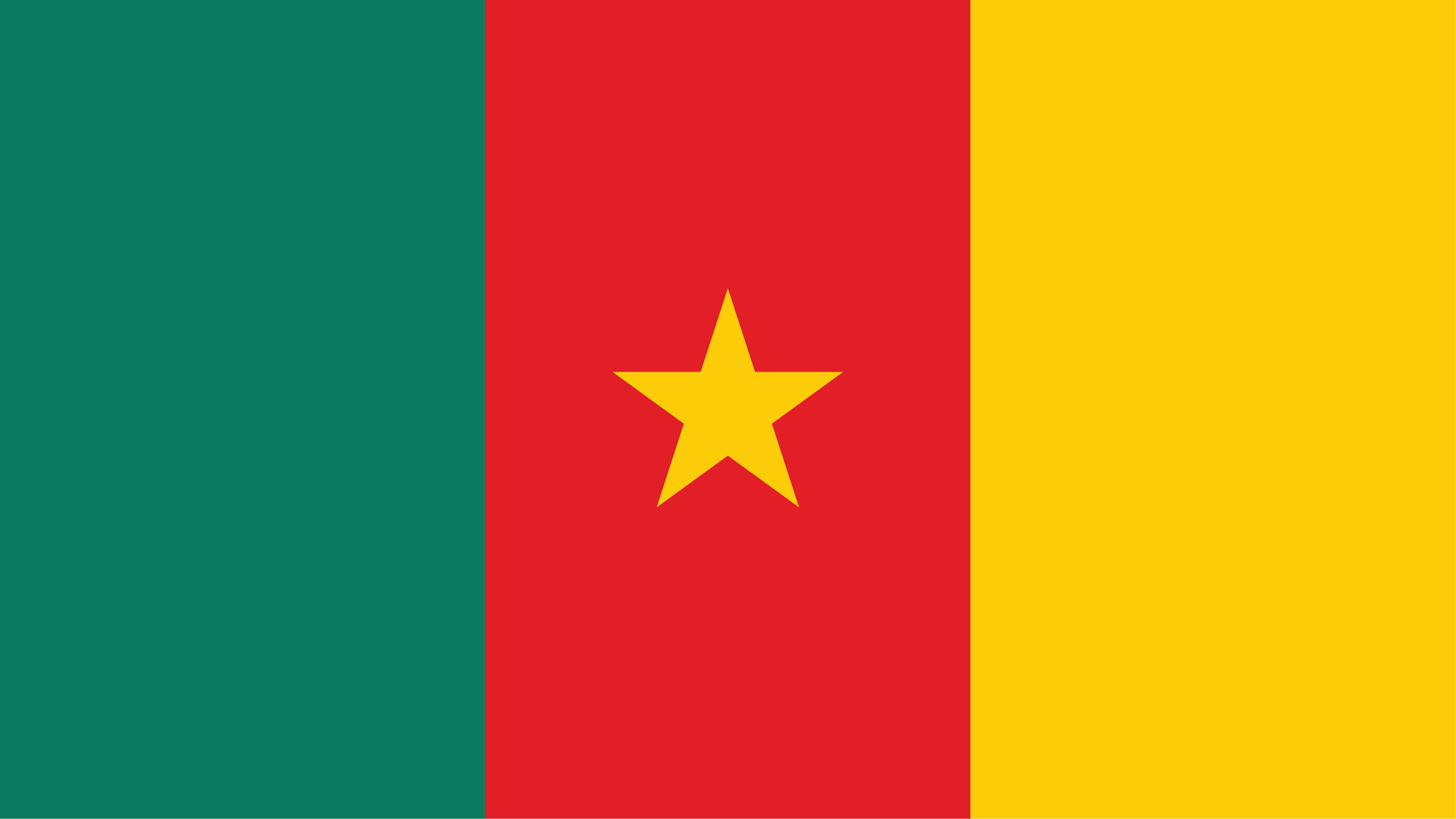
Overview
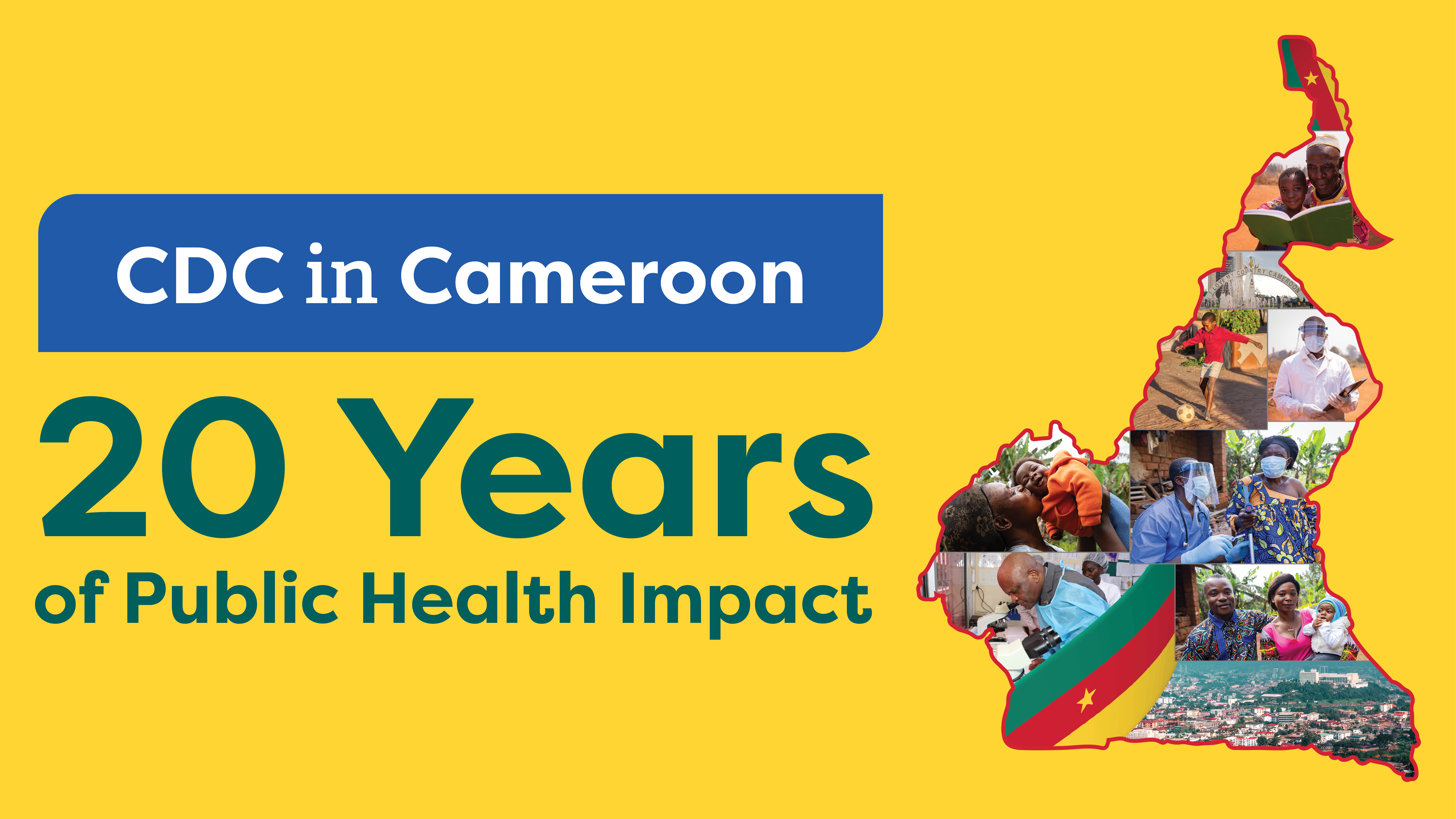
CDC established an office in Cameroon in 2004. CDC Cameroon works closely with the Government of Cameroon and partner organizations to detect, prevent and control infectious disease outbreaks, and build and strengthen the country's core public health capabilities. These include data and surveillance, laboratory capacity, workforce and institutions, prevention and response, innovation and research, and policy communications and diplomacy. CDC’s work aims to protect the health of our nations and public health around the world.
CDC has a long history of contributing to public health in Cameroon, starting in 1998 with an HIV laboratory and research program. Over the years, CDC has supported the Government of Cameroon in making significant strides to strengthen health systems and reduce illness and death. Collective efforts over the past two decades have boosted Cameroon's ability to prevent, detect, and respond to complex public health challenges. CDC provides lifesaving health services to fight COVID-19, HIV, tuberculosis, malaria, and other reportable diseases.
Global health security
CDC builds on previous Global Health Security Agenda (GHSA) efforts in Cameroon, in alignment with the Global Health Security and Diplomacy framework. CDC collaborates with Cameroon's MOH to build and maintain core public health capabilities. Key capabilities include disease surveillance, laboratory systems, emergency management, and workforce development. Strengthening the national health data infrastructure is an overarching component of all activities. CDC's efforts have strengthened health security in Cameroon, in the Central African region, and globally.
Workforce development
CDC supports training disease detectives through the Cameroon Field Epidemiology Training Program (CAFETP), established in 2010. The program consists of the two-year advanced FETP, nine-month intermediate FETP, and three-month frontline FETP. CAFETP has trained over 1,700 graduates from various sectors. Since 2017, CDC has supported over 100 outbreak investigations in Cameroon, including COVID-19, mpox, cholera, measles, polio, and other threats.
Emergency response
In 2018, Cameroon’s Public Health Emergency Operations Center (EOC) was inaugurated with support from CDC and the Defense Threat Reduction Agency. Its inauguration has led to more robust responses by improving multisectoral collaboration, data sharing, and decision-making. The EOC can be activated within 24 hours to coordinate emergency response activities for human and animal health threats. MOH has undertaken at least 75 public health investigations with U.S. government support.
CDC’s Public Health Emergency Management Program has trained and certified MOH staff in emergency management. Certified staff have worked with regional districts to establish a similar program at the subnational level in Cameroon. The goal is to create a pool of well-trained EOC managers for human and animal sectors.
Additional efforts
The global health security portfolio also includes efforts on:
- Childhood immunization.
- Influenza sentinel surveillance.
- Capacity strengthening for anthrax and brucellosis surveillance and diagnostics.
- Border health measures.
- Maternal and perinatal death surveillance and response.
- Expanding community event-based surveillance to fine-tune outbreak detection and response.
- Emergency risk communication.
CDC works with national partners to increase capacity for mpox laboratory diagnostics, viral genome sequencing, and ecological investigations.
Key achievements
- CDC-supported CAFETP trainees support more than 90% of disease investigations.
- Cameroon's EOC has been activated 15 times for public health emergencies.
- Conducted active border surveillance during the 2023 Marburg Virus Disease Outbreak in Equatorial Guinea, which resulted in detecting over 40 alerts.
HIV and TB
As a key implementer of the U.S. President's Emergency Plan for AIDS Relief (PEPFAR), CDC plays an essential role in the fight against HIV and TB. With unmatched scientific and technical knowledge and long-standing relationships with ministries of health, CDC is uniquely positioned to advance HIV, TB, and other infectious diseases and minimizing their risk from entering the U.S.
Through PEPFAR, CDC provides critical support to Cameroon's public health infrastructure, improving the country's ability to prevent, detect, and respond to HIV, TB, and other infectious diseases and minimize the risk of high-consequence pathogens from reaching the U.S.
Malaria
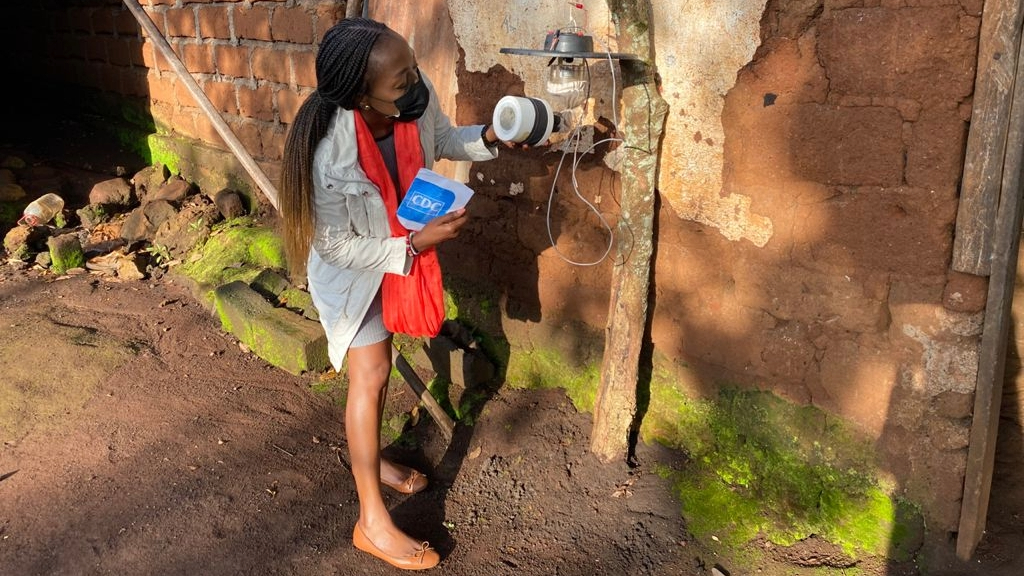
CDC has collaborated with partners to support implementation of malaria prevention and control activities in Cameroon since 2017. CDC-supported activities have included providing technical input in:
- Improving entomological monitoring and insecticide- and drug-resistance management.
- Improving case management in health facilities and at the community level.
- Strengthening programs to prevent malaria in pregnancy.
- Providing seasonal medication to prevent malaria during peak transmission seasons.
- Training disease detectives focused on malaria.
Key achievements
CDC has supported:
- Training 181 CAFETP graduates focused on malaria
- Training 135 laboratory technicians on microscopic diagnosis of malaria
- Assessing first-line malaria treatments to detect antimalarial resistance
